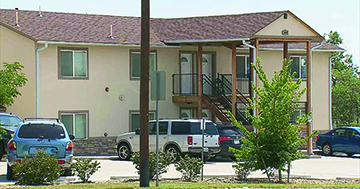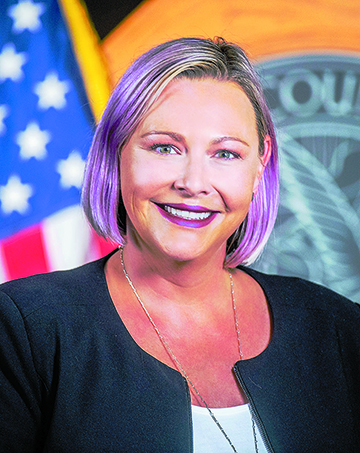by Robert Davis
“It’s wild to think that if Full House was filmed in Denver, then Joey could get evicted,” one Denver resident said as City Council approved a controversial text amendment to its zoning code.

Group Living: The 200-page Group Living Amendment was passed at the nearly 7-hour long February 8, 2021, meeting of the Denver City Council by an 11-2 margin. The amendment expands the number of unrelated adults allowed to live in a single-family home up to five.
Known as the Group Living Amendment, it expands the number of unrelated adults allowed to live in a single-family home up to five, bringing Denver’s group living ordinances in line with cities like Telluride, Aspen, and Colorado Springs.
Senior City Planner Andrew Webb, who sponsored the 200-page amendment, described it as “a move away from current regulations that prohibit or are obstacles to providing care for our most vulnerable residents, and from exclusionary regulations of the past that relegated certain people to industrial parts of the city that often border our poorest communities.”
The amendment passed by an 11-2 margin at the February 8, 2021, City Council meeting. Councilmembers Amanda Sawyer (District 5) and Kevin Flynn (District 2) voted against it. 1,143 written comments were submitted prior to the vote. 619 comments were in support and 524 were in opposition.
Groups such as Neighborhood Coalitions of Denver, All In Denver, and YIMBY Denver supported the amendment. Many single-family homeowners and several registered neighborhood organizations (RNO) vehemently opposed it.
During the nearly eight hour public hearing, several residents voiced opposition to increasing density through congregate living in Denver’s single-family neighborhoods. They said the amendment will only serve to decrease property values, increase crime, and destabilize neighborhoods.
Supporters described the amendment as a first step, but argued some of compromises made by City Council leading up to its passage made the amendment needlessly watered down.
One compromise was continuing the prohibition of community corrections facilities in single-family, multifamily, and row house districts. The amendment also restricts large residential care facilities to parcels of land used for civic, public or institutional purposes. Examples include unused churches, schools, and government buildings.
Other supporters told stories of how living afoul of Denver’s current prohibitions on unrelated adults living together helped them overcome adversity or youthful mistakes. Some had lived in community corrections or residential care facilities and had grown up to become homeowners.
“This issue is bigger than the cars parked on the street. It’s about our neighbors; the people who live in our communities. We need to start supporting our neighbors, even the ones who don’t look like us,” said Kiera Jackson, who lives in Montbello.
Mary Coddington, who works with local housing group Neighborhood Development Collaborative, said cities with similar policies like the Group Living Amendment haven’t seen the rising crime rates or lower property values that opponents suppose.

Denver City Councilmembers Amanda Sawyer (District 5) and Kevin Flynn (District 2) voted against the Group Living Amendment at the City Council meeting on February 8, 2021.
 “Denver is really far behind most cities when it comes to common sense group living policies,” she said. “Expansion of areas where community corrections and residential care facilities really need to happen. These facilities are designed to help people get on their feet and reenter communities. But, these efforts are undercut if they’re still segregated away from residential areas.”
“Denver is really far behind most cities when it comes to common sense group living policies,” she said. “Expansion of areas where community corrections and residential care facilities really need to happen. These facilities are designed to help people get on their feet and reenter communities. But, these efforts are undercut if they’re still segregated away from residential areas.”
For business owners like Gail Lindley, who owns Denver Book Binders, the amendment could have large implications on their property taxes. The amendment essentially unlocks potential land uses in several parts of the city, thereby guaranteeing a steeper property tax bill in the near future.
Denver Book Binders sits on a nearly 10,000 sq. ft. lot. In 2009, the company paid nearly $13,000 in property taxes, according to Lindley. By 2019, that bill had ballooned to over $55,000.
“To me, this proposal just sucks.” Lindley told the Glendale Cherry Creek Chronicle. “It was passed under the cover of night and nothing was known about who was making decisions until the Mayor’s office was sued.”
In August 2020, Denver resident Florence Sebern filed a Colorado Open Records Act request with the Mayor’s Office requesting information about the Group Living Advisory Committee, a 40-member committee comprised of developers, neighborhood representatives, city officials, nonprofit and business leaders.
The Mayor’s Office initially denied the request. After a lengthy court battle, a District Judge ruled Sebern was entitled to the records. They revealed only eight members of the committee represented neighborhoods, and that 85 percent of the group members stood to profit from the amendment, Sebern said at the public hearing.
“For the last two or three years, only a handful of individuals were making decisions for others,” she added.
Following the vote, Councilwoman Sawyer released a statement saying she supports updating Denver’s definition of household to reflect the way people are already living in the city. However, she couldn’t see her way to the residential care “side” of the law.
“I agree with the vast majority of the residents who reached out to our office over the past few weeks to advocate against these zoning code changes because these changes are not thoughtful… However, I don’t believe the issues with the residential care ‘side’ of the law were adequately addressed,” she said.
